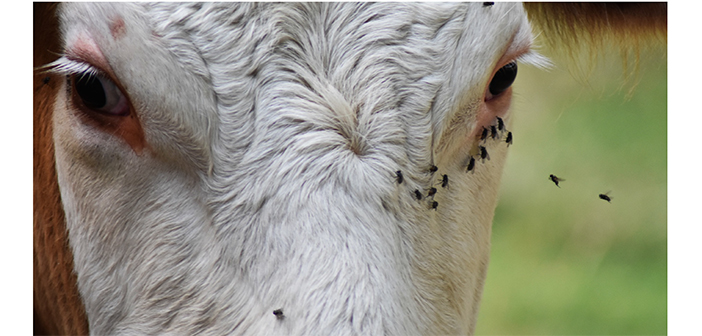Farmers are being urged to protect cattle against flies before populations rapidly increase, to avoid costly health issues and drops in productivity.
Matt Colston, ruminant technical consultant at Elanco Animal Health, said that while the cool, wet weather in May will have kept flies at bay, populations will multiply rapidly as temperatures increase. He advised getting on top of the problem early to protect stock for the summer season.
Mr Colston said: “Not only do flies spread disease, they’re also extremely irritating and cause a high level of stress to livestock. This can really impact feed intakes and subsequently performance, with associated drops in milk yield or daily liveweight gain typical.”
He said that a preventive approach is key for successful control, and a good rule of thumb is to treat cattle a month ahead of when flies became a visible problem last year.
“To protect cattle from adult flies, an insecticidal treatment is recommended,” Mr Colston said. “A pour on such as Flyporis easy to administer and can offer up to eight weeks control. However, if heavy infestations are present, it’s best to repeat treatment after four weeks.
“Flypor only has a six-hour milk withdrawal and three-day meat withdrawal, which means it can be applied after milking and doesn’t hinder production.”
If cattle are fully housed, it’s important to also consider environmental control measures to tackle flies within the larval stages.
Mr Colston added: “Storing muck away from housed cattle and keeping the yard as clean as possible is important, but it may also be necessary to apply an environmental treatment, such as Neporex, directly to the manure to treat fly breeding sites as the majority of the fly population is in the egg and larval stages at any one time.”
Environmental treatments should be applied early in the fly season as soon as houseflies begin to breed to prevent a rapid increase in populations.
“Further treatments throughout the season may then be required to prevent flies reaching nuisance levels. Monitoring the manure for maggot activity can provide a useful early indication as to timing of subsequent treatments,” said Mr Colston.
“Getting on top of flies now before populations explode in hotter temperatures will make the problem easier to manage for the rest of the season.”


